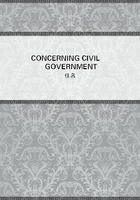
第57章
226. Thirdly: I answer, that this power in the people of providing for their safety anew by a new legislative when their legislators have acted contrary to their trust by invading their property, is the best fence against rebellion, and the probable means to hinder it. For rebellion being an opposition, not to persons, but authority, which is founded only in the constitutions and laws of the government: those, whoever they be, who, by force, break through, and, by force, justify their violation of them, are truly and properly rebels. For when men, by entering into society and civil government, have excluded force, and introduced laws for the preservation of property, peace, and unity amongst themselves, those who set up force again in opposition to the laws, do rebellare- that is, bring back again the state of war, and are properly rebels, which they who are in power, by the pretence they have to authority, the temptation of force they have in their hands, and the flattery of those about them being likeliest to do, the proper way to prevent the evil is to show them the danger and injustice of it who are under the greatest temptation to run into it.
227. In both the forementioned cases, when either the legislative is changed, or the legislators act contrary to the end for which they were constituted, those who are guilty are guilty of rebellion. For if any one by force takes away the established legislative of any society, and the laws by them made, pursuant to their trust, he thereby takes away the umpirage which every one had consented to for a peaceable decision of all their controversies, and a bar to the state of war amongst them. They who remove or change the legislative take away this decisive power, which nobody can have but by the appointment and consent of the people, and so destroying the authority which the people did, and nobody else can, set up, and introducing a power which the people hath not authorised, actually introduce a state of war, which is that of force without authority; and thus by removing the legislative established by the society, in whose decisions the people acquiesced and united as to that of their own will, they untie the knot, and expose the people anew to the state of war. And if those, who by force take away the legislative, are rebels, the legislators themselves, as has been shown, can be no less esteemed so, when they who were set up for the protection and preservation of the people, their liberties and properties shall by force invade and endeavour to take them away; and so they putting themselves into a state of war with those who made them the protectors and guardians of their peace, are properly, and with the greatest aggravation, rebellantes, rebels.
228. But if they who say it lays a foundation for rebellion mean that it may occasion civil wars or intestine broils to tell the people they are absolved from obedience when illegal attempts are made upon their liberties or properties, and may oppose the unlawful violence of those who were their magistrates when they invade their properties, contrary to the trust put in them, and that, therefore, this doctrine is not to be allowed, being so destructive to the peace of the world; they may as well say, upon the same ground, that honest men may not oppose robbers or pirates, because this may occasion disorder or bloodshed. If any mischief come in such cases, it is not to be charged upon him who defends his own right, but on him that invades his neighbour's. If the innocent honest man must quietly quit all he has for peace sake to him who will lay violent hands upon it, I desire it may be considered what kind of a peace there will be in the world which consists only in violence and rapine, and which is to be maintained only for the benefit of robbers and oppressors. Who would not think it an admirable peace betwixt the mighty and the mean, when the lamb, without resistance, yielded his throat to be torn by the imperious wolf? Polyphemus's den gives us a perfect pattern of such a peace. Such a government wherein Ulysses and his companions had nothing to do but quietly to suffer themselves to be devoured. And no doubt Ulysses, who was a prudent man, preached up passive obedience, and exhorted them to a quiet submission by representing to them of what concernment peace was to mankind, and by showing [what] inconveniencies might happen if they should offer to resist Polyphemus, who had now the power over them.
229. The end of government is the good of mankind; and which is best for mankind, that the people should be always exposed to the boundless will of tyranny, or that the rulers should be sometimes liable to be opposed when they grow exorbitant in the use of their power, and employ it for the destruction, and not the preservation, of the properties of their people?
230. Nor let any one say that mischief can arise from hence as often as it shall please a busy head or turbulent spirit to desire the alteration of the government. It is true such men may stir whenever they please, but it will be only to their own just ruin and perdition.